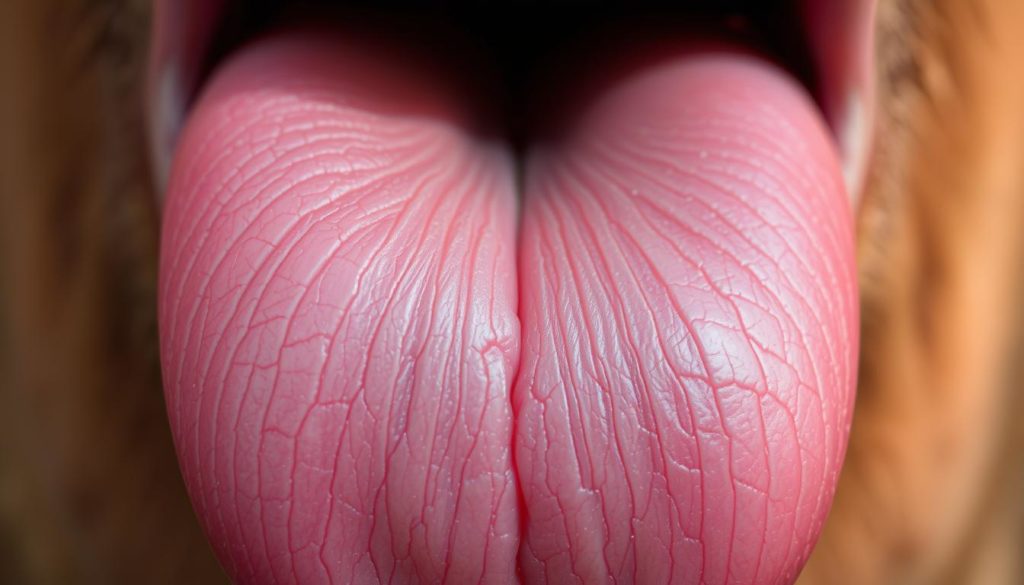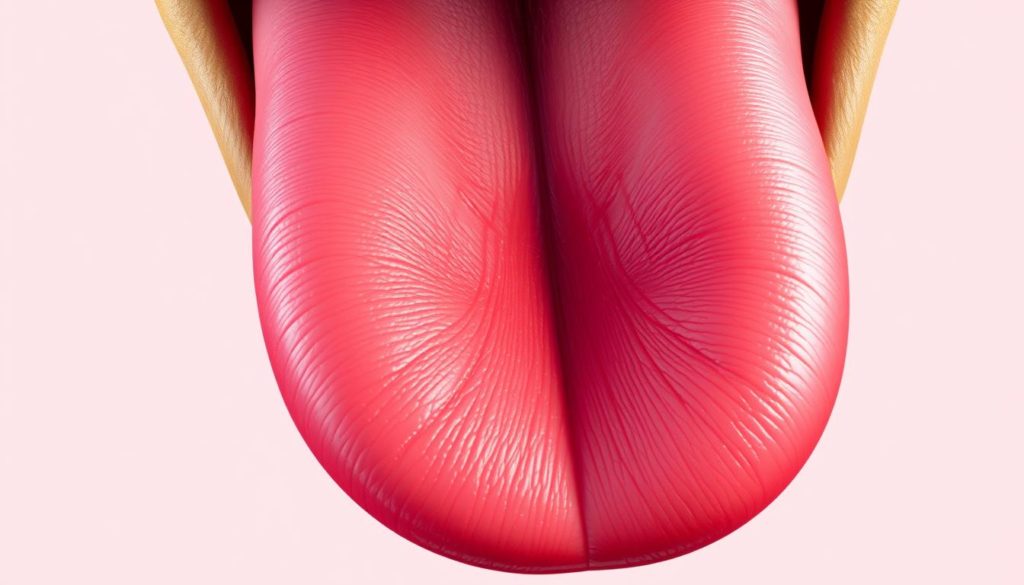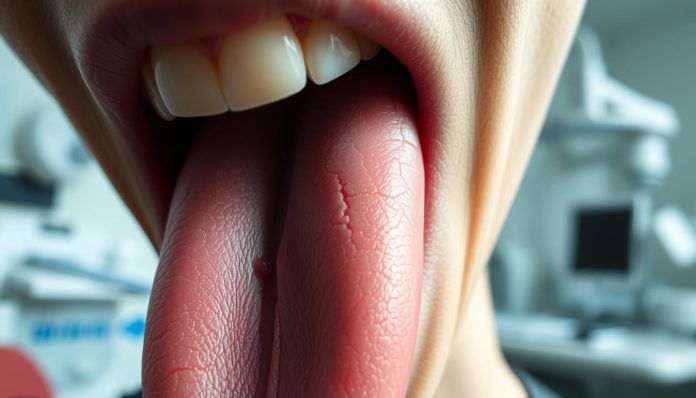Did you know up to 5% of people have a fissured tongue? This condition shows deep grooves and cracks on the tongue. It’s usually harmless. But, understanding the causes and managing it is important. If not cared for properly, it can cause problems like food buildup and discomfort.
Genetics might be a big factor behind a fissured tongue. Also, some health issues and bad oral hygiene can make it worse. This article talks about how to care for a fissured tongue. We will cover spotting symptoms, finding good treatments, and daily care tips. We aim to give you all the info for easing discomfort and keeping your mouth healthy.
Keep an eye out for tips on treating a fissured tongue. These suggestions will help you handle symptoms better. The goal is to lead a comfortable and healthy life.
What is a Fissured Tongue?
A fissured tongue is also known as a scrotal or plicated tongue. It has grooves or fissures on its surface. These grooves vary in length and depth, making the tongue look unique. While pictures can help identify it, seeing a dentist is best for a proper check-up.

Most of the time, a fissured tongue is not harmful and has no symptoms. But, food and bacteria can get stuck in these grooves. This could cause infection if the tongue isn’t kept clean. Even though it might look odd, it’s usually not serious and can be looked after with normal tooth brushing and tongue cleaning.
Common Symptoms of a Fissured Tongue
It’s crucial to spot the symptoms of a fissured tongue early. You can usually see the condition by looking at and feeling the tongue.
Visual Signs
The main sign of a fissured tongue is how it looks. You’ll see lines and cracks that go out from the middle. The depth and number of these grooves make the tongue unique.

Physical Discomfort
Some people feel discomfort, especially when eating or drinking certain things. Even though it doesn’t usually hurt, the cracks can catch food and germs. This might cause a bit of swelling or pain. Watching out for these fissured tongue symptoms can help keep your mouth healthy.
Causes of a Fissured Tongue
The causes of a fissured tongue vary. They include genetics, health conditions, and how well you care for your mouth. Let’s explore these factors more closely.
Genetic Factors
Genetics play a big role in fissured tongues. If your family members have it, you might too. This shows it can be passed down through families.
Underlying Health Conditions
Certain health issues like Sjögren’s syndrome, psoriasis, and Down syndrome are linked to fissured tongues. These can make the grooves on your tongue deeper or more noticeable.
Lack of Proper Oral Hygiene
Not taking care of your mouth can make tongue grooves worse. If you don’t clean well, bits of food and bacteria can build up. This can lead to more problems.
| Cause | Description | Impact |
|---|---|---|
| Genetic Factors | Hereditary influence often causing a familial pattern | Increased likelihood if immediate family members are affected |
| Underlying Health Conditions | Diseases such as Sjögren’s syndrome, psoriasis, and Down syndrome | Leads to more severe grooves and complications |
| Lack of Proper Oral Hygiene | Insufficient cleaning of the tongue | Can cause accumulation of debris and bacteria |
Diagnosing a Fissured Tongue
Getting a diagnosis for a Fissured Tongue is simple during a regular check-up. Your dentist or doctor will examine your tongue carefully. They look for the unique grooves and fissures that mark this condition. No special tests are needed, just a visual check.
To make sure they diagnose a Fissured Tongue correctly, your healthcare provider will ask you certain questions. They’ll want to know if you have any symptoms, about your family’s health history, and other health conditions you might have. This careful questioning helps to make sure other mouth issues aren’t missed.
The diagnosis process is pretty straightforward and involves:
| Step | Description |
|---|---|
| Initial Observation | Visual examination to identify grooves and fissures on the tongue. |
| Questionnaire | Discussion of symptoms, family history, and associated conditions to ensure comprehensive assessment. |
| Final Diagnosis | Confirmation of the condition and ruling out other potential oral health issues. |
In essence, diagnosing a Fissured Tongue comes down to a thorough clinical exam and smart questioning. This ensures an accurate diagnosis of your situation.
Effective Treatments for a Fissured Tongue
There isn’t a permanent fix for fissured tongue, but there are ways to handle it. You can use medical treatments, over-the-counter products, and home remedies. Together, they help control your condition.
Medical Treatments
Doctors may give you medicine for any health issues that worsen your fissured tongue. These medicines ease discomfort and help keep your mouth healthy.
Over-the-Counter Solutions
Antiseptic mouthwashes are key for treating fissured tongues. They keep your mouth clean and cut down on bacteria in the fissures. This reduces the chance of infections.
Home Remedies
Don’t underestimate home remedies. Using a soft toothbrush and keeping your tongue clean matter a lot. It reduces pain and keeps your mouth healthier.
- Maintain regular brushing and flossing routines
- Use a soft-bristled toothbrush
- Rinse with antiseptic mouthwash daily
- Stay hydrated to prevent dry mouth
Using all these methods together can greatly help with a fissured tongue. This approach enhances your oral health and comfort.
Daily Care Tips for Managing a Fissured Tongue
It’s crucial to care for your Fissured Tongue for overall oral health. Gently brushing the tongue with a soft toothbrush is a good start. This can help remove particles stuck in the tongue’s crevices.
Add a tongue scraper to your daily care to improve cleanliness. This tool is great for getting rid of bacteria hiding in the tongue’s grooves. Using it makes a big difference in Fissured Tongue Care.
Don’t forget about using an antiseptic mouthwash. It keeps your mouth feeling fresh. It also stops bacteria from growing in the fissures, which is key.
Being hydrated is key for Fissured Tongue Care too. A moist mouth washes away food bits and lowers bacteria. This is very important for those with fissured tongues.
- Brush your tongue daily with a soft toothbrush.
- Use a tongue scraper consistently.
- Rinse with an antiseptic mouthwash for added protection.
- Stay hydrated to keep your mouth moist and healthy.
Importance of Oral Hygiene in Preventing Tongue Fissures
Good oral hygiene is crucial for preventing and managing fissured tongue. It can stop fissures from getting worse. It also reduces discomfort.
Best Practices
Follow these best practices to keep your oral hygiene top-notch:
- Brush your teeth at least twice a day and don’t forget to gently clean your tongue.
- Floss daily to get rid of food particles and fight oral bacteria.
- Use therapeutic mouthwashes to fight bacteria and inflammation.
- Drink plenty of water to keep your mouth moist and clean naturally.
Recommended Products
People with a fissured tongue should use specific products. These items help keep the mouth clean and reduce irritation:
| Product Type | Recommendation | Benefit |
|---|---|---|
| Toothpaste | Fluoride Toothpaste | Strengthens enamel and fights cavities |
| Mouthwash | Alcohol-Free Mouthwash | Prevents irritation and dryness |
| Treatment | Antibacterial/Fungal Treatments (if recommended) | Kills bad bacteria and infections |
When to See a Doctor for a Fissured Tongue
Having symptoms of a Fissured Tongue can feel uncomfortable. It’s key to know when it’s time to see a doctor or dentist. If there’s constant pain or bleeding, make an appointment quickly. Trouble eating because of deep cracks might also mean you need to be checked.
If your tongue is swollen, red, or has some discharge, you might have an infection. It’s crucial to see a healthcare provider without delay in such cases. An untreated infection can worsen the cracks in your tongue.
If symptoms like persistent pain, bleeding, or significant difficulty in eating emerge, professional evaluation is necessary.
A medical expert may send you to a specialist, like an oral surgeon or dermatologist. This is often the case if your Fissured Tongue is part of a bigger health issue. It’s important to keep an eye on the symptoms. And, get checked by a doctor right away if needed.
| Symptom | When to See a Doctor |
|---|---|
| Persistent Pain | Immediately, especially if it’s not relieved by over-the-counter pain medications. |
| Bleeding | Consult a healthcare provider if bleeding persists despite oral hygiene improvements. |
| Difficulty Eating | Seek medical advice if eating becomes difficult due to deep fissures. |
| Suspected Infection | Get a professional evaluation if there’s swelling, redness, or discharge indicating an infection. |
Keeping track of these symptoms and knowing when to get medical help is crucial. This way, you can manage your Fissured Tongue well and avoid more serious issues.
Dietary Considerations for Fissured Tongue Relief
Managing a fissured tongue involves more than just oral hygiene and medical care. Your diet plays a big role in reducing or increasing discomfort. Some foods can make the grooves in your tongue hurt more, while others can help heal. Knowing what to eat is important for getting better.
Foods to Avoid
With a fissured tongue, certain foods should be avoided. Spicy foods can make your tongue more sensitive. Foods like citrus fruits and tomatoes can worsen the fissures because they’re acidic. Also, foods that are very seasoned or served hot can increase discomfort. Avoiding these foods can lessen pain and aid healing.
Beneficial Foods
Including helpful foods in your diet can provide relief. Foods high in vitamins B and C are good for oral health. Omega-3 fatty acids, in fish and flaxseeds, can lower inflammation. Yogurt with live probiotics balances mouth bacteria. A diet with these foods can greatly improve your comfort.
By choosing the right foods and avoiding harmful ones, you can manage a fissured tongue better. Consistency in your diet is key to feeling better.
FAQ
What causes a fissured tongue?
A fissured tongue happens due to genetics, health issues like psoriasis, or not keeping the mouth clean. It’s key to know the cause to tackle it right.
How can I manage symptoms of a fissured tongue?
Keep your mouth clean, use antiseptic rinses, and drink plenty of water. Brush softly and scrape your tongue to ease any discomfort.
What are the visual signs of a fissured tongue?
Look for deep grooves or cracks on the surface of your tongue. These lines might be many or few, spreading from the middle.
Why is oral hygiene crucial for a fissured tongue?
Cleanliness stops debris and germs from gathering in the tongue’s cracks. This lowers inflammation risks. Brush, floss, and rinse regularly.
When should I see a doctor for my fissured tongue?
See a doctor if you have ongoing pain, bleeding, trouble eating, or think there might be an infection. A check-up will make sure nothing else is wrong.
What treatments are available for a fissured tongue?
There’s no cure, but you can lessen symptoms. This might mean meds for other health issues, over-the-counter rinses, or natural care techniques.
What foods should I avoid if I have a fissured tongue?
Stay away from spicy, acidic, or very hot foods. Choosing milder foods helps avoid irritation and keeps the mouth feeling better.
How is a fissured tongue diagnosed?
A doctor or dentist spots it by looking for typical cracks during an exam. Usually, no special tests are needed, but your health history will be checked.
Is a fissured tongue a serious condition?
Mostly, it’s harmless but keeping the mouth clean is crucial. Proper care stops food bits from getting stuck and wards off swelling.
What are some daily care tips for managing a fissured tongue?
Each day, gently brush your tongue and use a scraper. Rinse with mouthwash that kills germs. Drinking water keeps your mouth moist and clean.


